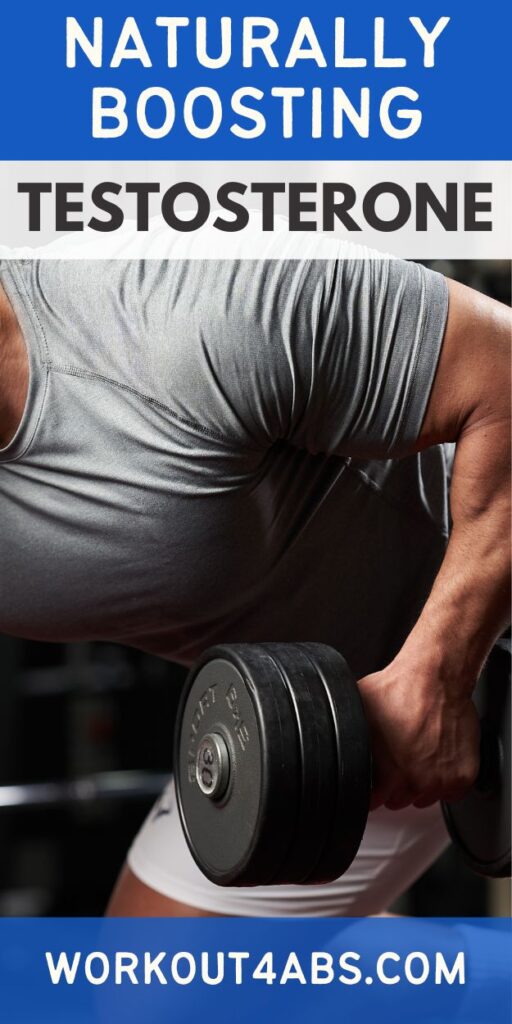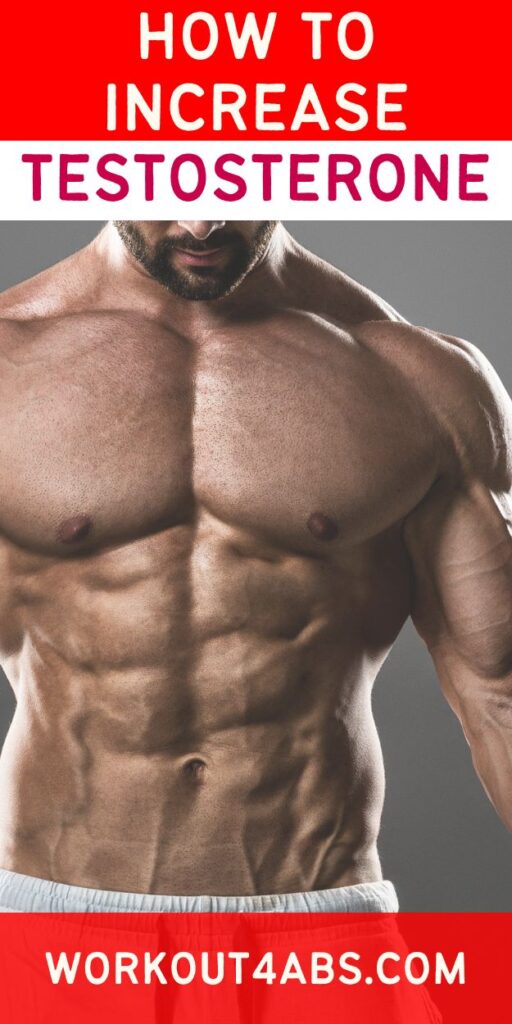Learn how to increase testosterone and explore science-backed strategies and lifestyle changes that can elevate testosterone levels without the need for synthetic interventions. Discover how diet, exercise, sleep, and other factors can support hormonal balance and overall well-being.
How to Naturally Boost YOUR Testosterone
If you enjoyed these tips, please save this pin to your Pinterest Board.

Resistance Training to Improve Testosterone Levels
Resistance training, also known as strength training or weightlifting, can increase testosterone levels through various physiological mechanisms. Testosterone is a hormone that plays a crucial role in muscle development, energy levels, and overall health. Here’s how resistance training can boost testosterone production:
- Muscle Stimulation:
- Resistance training involves lifting weights or performing bodyweight exercises that stress your muscles. This stress signals your body to adapt and grow stronger.
- To repair and rebuild the stressed muscle fibers, your body relies on anabolic hormones, including testosterone. Higher muscle engagement during resistance training stimulates greater testosterone production.
- Intensity and Volume:
- The intensity and volume of resistance training workouts influence testosterone release. Heavier weights and compound exercises like squats, deadlifts, and bench presses tend to be more effective at increasing testosterone levels than lighter weights or isolation exercises.
- Higher-intensity workouts with more sets and repetitions can further promote testosterone release.
- Rest and Recovery:
- Adequate rest and recovery are crucial for testosterone production. Resistance training creates microscopic muscle damage that needs time to repair and grow.
- During rest and sleep, especially deep sleep, testosterone is released in higher amounts, aiding muscle repair and growth.
- Body Composition:
- Resistance training helps improve body composition by increasing muscle mass and reducing body fat. Higher muscle mass is associated with greater testosterone production.
- Additionally, reducing excess body fat can lower the levels of estrogen, a hormone that can suppress testosterone.
- Metabolic Benefits:
- Resistance training improves insulin sensitivity and glucose metabolism, which can positively affect hormone balance, including testosterone.
- Enhanced metabolic health can help optimize hormonal function, including the production of testosterone.
- Post-Exercise Hormone Surge:
- After a resistance training session, there is often a temporary surge in testosterone levels, particularly if the workout is intense.
- This post-exercise increase can contribute to muscle growth and recovery.
- Consistency and Progressive Overload:
- Consistency in resistance training routines and a gradual increase in training intensity (known as progressive overload) are key factors in maintaining higher testosterone levels over time.
- Nutrition and Hydration:
- Proper nutrition, including an adequate intake of macronutrients like protein and healthy fats, can support healthy testosterone levels.
- Staying hydrated is also essential for hormone regulation.
- Stress Management:
- Chronic stress and elevated cortisol levels can suppress testosterone production. Resistance training can help reduce stress by releasing endorphins and improving mood.
It’s important to note that while resistance training can increase testosterone levels, the extent of the increase varies among individuals. Genetics, age, training intensity, nutrition, and other lifestyle factors all play a role in determining the magnitude of the effect. It’s also essential to approach resistance training safely and progressively to avoid overtraining and injuries, as excessive exercise can have the opposite effect on hormone levels. Consulting a fitness professional or healthcare provider can help tailor a resistance training program that optimizes testosterone production while considering individual needs and goals.
If you enjoyed these tips, please save this pin to your Pinterest Board.

Lower Body Fat To Increase Testosterone
High body fat percentage can lead to low testosterone levels through a complex interplay of hormonal, metabolic, and physiological factors. Testosterone is a critical hormone for overall health, and its production can be influenced by excess body fat in the following ways:
- Increased Estrogen Production:
- Adipose tissue (fat cells) can convert testosterone into estrogen through a process called aromatization. As body fat levels rise, so does the potential for increased estrogen production.
- High estrogen levels can lead to hormonal imbalances, including a decrease in testosterone.
- Leptin Resistance:
- Fat cells produce a hormone called leptin, which regulates appetite and metabolism. In individuals with excess body fat, leptin resistance can develop, where the body becomes less responsive to the hormone’s signals.
- Leptin resistance can disrupt the hypothalamic-pituitary-gonadal (HPG) axis, a complex system involving the brain and gonads that regulates testosterone production. This disruption can lower testosterone levels.
- Insulin Resistance:
- High body fat percentage is often associated with insulin resistance, where the body’s cells become less responsive to insulin, a hormone that regulates blood sugar levels.
- Insulin resistance can impair testicular function and reduce testosterone production.
- Inflammatory Cytokines:
- Adipose tissue, especially visceral fat (fat around the internal organs), produces inflammatory cytokines, which are molecules involved in the body’s immune response.
- Chronic inflammation can negatively impact the HPG axis and disrupt normal hormonal signaling, potentially leading to lower testosterone levels.
- Lower Sex Hormone-Binding Globulin (SHBG):
- High body fat levels are associated with lower levels of sex hormone-binding globulin (SHBG), a protein that binds to sex hormones like testosterone.
- Reduced SHBG levels can lead to higher levels of free testosterone (unbound to SHBG), but this may not necessarily translate to higher overall testosterone availability as free testosterone is more susceptible to conversion to estrogen.
- Reduced Physical Activity:
- High body fat levels can contribute to reduced physical activity and a sedentary lifestyle, which can independently lead to lower testosterone levels.
- Lack of exercise and physical activity can affect the endocrine system and hormone regulation.
- Psychological and Self-Esteem Factors:
- High body fat percentage can have psychological effects, including reduced self-esteem and body image concerns.
- Psychological stress and a negative self-image can activate the body’s stress response, leading to elevated cortisol levels. Chronic stress and elevated cortisol can suppress testosterone production.
- Age-Related Factors:
- Testosterone levels tend to naturally decline with age. High body fat can exacerbate this decline, leading to lower testosterone levels in older individuals.
It’s important to recognize that low testosterone levels can have a range of health consequences, including reduced muscle mass, bone density, energy levels, and libido. Addressing excess body fat through a combination of regular exercise, a balanced diet, and lifestyle modifications can help improve testosterone levels and overall health. Individuals concerned about their testosterone levels should consult with a healthcare provider for a thorough evaluation and personalized guidance on managing their hormonal health.
Get More Sleep
Getting more sleep plays a crucial role in increasing testosterone levels because it directly influences the body’s hormonal balance and supports various physiological processes. Here’s how adequate sleep contributes to higher testosterone production:
- Hormonal Regulation:
- Sleep helps regulate the body’s hormonal systems, including those responsible for testosterone production. Testosterone is primarily produced during deep sleep, specifically during the rapid eye movement (REM) and slow-wave sleep (SWS) stages of the sleep cycle.
- Circadian Rhythm:
- The body’s natural sleep-wake cycle, or circadian rhythm, influences hormonal secretion, including testosterone. Testosterone levels typically follow a diurnal pattern, with the highest levels in the morning after a full night’s sleep.
- Consistent and sufficient sleep helps maintain a healthy circadian rhythm, supporting the body’s ability to produce testosterone at optimal times.
- Recovery and Repair:
- Sleep is a critical time for tissue repair, muscle growth, and recovery. Testosterone is essential for these processes, as it stimulates protein synthesis and the repair of damaged tissues.
- Adequate sleep provides the body with the necessary time and resources to recover, allowing for efficient testosterone synthesis and anabolic (muscle-building) processes.
- Stress Reduction:
- Sleep helps reduce stress, particularly by lowering the production of the stress hormone cortisol. Elevated cortisol levels can suppress testosterone production.
- A lack of sleep or poor sleep quality can lead to increased stress and cortisol levels, negatively impacting testosterone levels.
- Leptin and Ghrelin Regulation:
- Sleep influences hunger-regulating hormones like leptin and ghrelin. Inadequate sleep can disrupt these hormones, leading to increased appetite, overeating, and potentially weight gain.
- Weight gain, especially in the form of excess body fat, can contribute to hormonal imbalances and lower testosterone levels.
- Insulin Sensitivity:
- Quality sleep supports improved insulin sensitivity, reducing the risk of insulin resistance and metabolic disorders. Insulin resistance can disrupt testosterone regulation and production.
- Restorative sleep promotes healthy glucose metabolism, helping to maintain hormonal balance.
- Mood and Mental Health:
- Sleep is essential for emotional well-being and mental health. Poor sleep or chronic sleep deprivation can lead to mood disturbances, anxiety, and depression.
- Mental health issues and chronic stress can contribute to hormonal imbalances, including lower testosterone levels.
- Physical Activity and Recovery:
- Sleep impacts physical performance and recovery. Athletes and individuals engaged in resistance training may experience reduced strength and muscle gains with inadequate sleep.
- Quality sleep supports better physical performance, which, in turn, can positively influence testosterone levels.
To optimize testosterone levels and overall health, it’s essential to prioritize good sleep hygiene practices, including maintaining a consistent sleep schedule, creating a comfortable sleep environment, and getting the recommended 7-9 hours of sleep per night for most adults. If sleep problems persist or are accompanied by symptoms of low testosterone, such as fatigue, decreased libido, or muscle loss, it’s advisable to consult a healthcare provider for a thorough evaluation and personalized guidance.
Get More Sunlight
Spending time outdoors in nature and getting more sunlight exposure can positively influence testosterone levels through various mechanisms, primarily involving the body’s response to natural light and environmental factors. Here’s how these activities can help increase testosterone:
- Vitamin D Synthesis:
- Sunlight exposure is a natural source of vitamin D, which is essential for maintaining hormonal balance, including testosterone production.
- Vitamin D acts as a hormone precursor, and its active form, calcitriol, plays a role in regulating testosterone production in the testes.
- Circadian Rhythm Regulation:
- Exposure to natural light helps regulate the body’s circadian rhythm, or internal clock, which controls the sleep-wake cycle and hormonal secretion.
- A consistent sleep-wake cycle promotes better sleep quality, allowing the body to produce testosterone during the night, when levels tend to be highest.
- Stress Reduction:
- Spending time in natural settings and engaging in outdoor activities can reduce stress and promote relaxation.
- Lower stress levels contribute to lower cortisol, a stress hormone that can inhibit testosterone production when chronically elevated.
- Physical Activity:
- Many outdoor activities involve physical exercise, which can positively influence testosterone levels. Regular physical activity, especially in a natural environment, supports muscle growth and overall health.
- Resistance training, such as hiking, biking, or outdoor sports, can help increase testosterone production.
- Mood Enhancement:
- Exposure to natural settings is associated with improved mood, reduced anxiety, and decreased symptoms of depression.
- Elevated mood and reduced stress can have a positive impact on hormonal balance, including testosterone levels.
- Melatonin Regulation:
- Natural light exposure during the day helps regulate the production of melatonin, a hormone that induces sleep at night. Melatonin and testosterone are interconnected in the body’s hormonal system.
- Proper melatonin regulation can support the body’s ability to produce testosterone during sleep.
- Aromatase Inhibition:
- Some research suggests that natural sunlight exposure may help inhibit the activity of aromatase, an enzyme responsible for converting testosterone into estrogen.
- Lower aromatase activity can help maintain a healthier balance between testosterone and estrogen levels.
- Improved Sleep Quality:
- Spending time outdoors and receiving natural light exposure during the day can help improve sleep quality by reinforcing the body’s natural sleep-wake cycle.
- Quality sleep is crucial for testosterone production.
To harness these benefits, aim to spend time outdoors in natural environments regularly. Engage in activities like hiking, cycling, walking, or simply enjoying a picnic in a park. Ensure you receive adequate sunlight exposure, but be mindful of sun safety practices, including wearing sunscreen to protect your skin from harmful UV rays.
While sunlight and nature exposure can positively impact testosterone levels, it’s important to remember that individual responses may vary. If you have specific concerns about your hormone levels or are considering making significant lifestyle changes, including spending more time outdoors, consult a healthcare provider for personalized guidance and recommendations.
If you enjoyed these tips, please save this pin to your Pinterest Board.

Home › Workout for Athletes ›How to Increase Testosterone